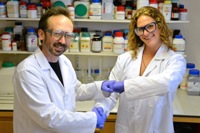Fist bump beats unhygienic handshake

Dr Dave Whitworth IBERS Senior Tutor and Senior Lecturer in Biochemistry and PhD student Sara Mela
28 July 2014
Bumping fists may be a more hygienic greeting than shaking hands, experiments at Aberystwyth University have revealed.
Habitual handshaking allows movement of germs between people, and can help spread contagious illness.
Using rubber gloves and a thick layer of E. coli, scientists exchanged handshakes, high fives and fist-bumps, and have shown that transfer of potentially disease-causing bacteria is highest during a handshake.
Dr Dave Whitworth, Senior lecturer at Aberystwyth University, and PhD student Sara Mela carried out the research, dipping a glove into a bacterial broth before gingerly extending a hand.
The pair tested three different greetings and assessed the amount of germs transferred from each contact.
They found that a high dose of bugs were passed on during a handshake.
This was reduced by over half in the high-five, and germ transfer was a whopping 90% lower when bumping fists.
The hygienic nature of the fist bump may be due in part to its speed (typically much quicker than a first-rate handshake) but also because there is a smaller area involved.
Direct contact is needed for most microbes to move, so minimising the parts of the hand that touch gives bacteria less chance to spread.
The fist-bumping researchers also looked at grip strength and found that a stronger handshake increased the amount of bacteria shared.
The study, published in the August edition of the American Journal of Infection Control, was inspired by an increase in measures to promote cleanliness in the workplace, such as hand-sanitizers and keyboard disinfectants.
Dr Whitworth said “People rarely think about the health implications of shaking hands. If the general public could be encouraged to fist-bump, there is genuine potential to reduce the spread of infectious diseases.”
“The fist bump: A more hygienic alternative to the handshake” by Sara Mela, BSc and David E. Whitworth, PhD appears in the American Journal of Infection Control, (www.ajicjournal.org) Volume 42, Issue 8 (August 2014).
IBERS
The Institute of Biological, Environmental and Rural Sciences (IBERS) is an internationally recognised research and teaching centre providing a unique base for research in response to global challenges such as food security, bioenergy and sustainability, and the impacts of climate change. IBERS scientists conduct basic, strategic and applied research from genes and molecules to organisms and the environment.
IBERS receives strategic research funding of £10.5m from the BBSRC to support long term mission driven research, and is a member of the National Institutes of Bioscience. IBERS also benefits from financial support from the Welsh Government, DEFRA and the European Union.
IBERS works with both academic and industrial partners, developing and translating innovative bioscience research into solutions designed to mitigate the impacts of climate change and plant and animal diseases, and deliver renewable energy and food and water security.
AJIC: American Journal of Infection Control
AJIC: American Journal of Infection Control covers key topics and issues in infection control and epidemiology. Infection preventionists, including physicians, nurses, and epidemiologists, rely on AJIC for peer-reviewed articles covering clinical topics as well as original research. As the official publication of APIC, AJIC is the foremost resource on infection control, epidemiology, infectious diseases, quality management, occupational health, and disease prevention. AJIC also publishes infection control guidelines from APIC and the CDC. Published by Elsevier, AJIC is included in MEDLINE and CINAHL.
AU20714



